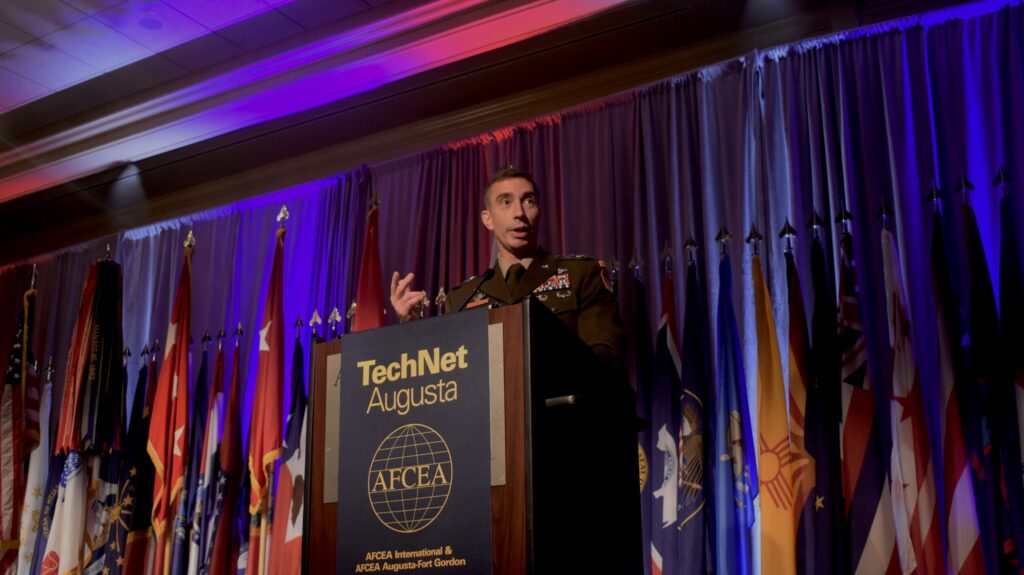Main topic: The Biden Administration's plans to defend the nation's critical digital infrastructure through an AI Cyber Challenge.
Key points:
1. The Biden Administration is launching a DARPA-led challenge competition to build AI systems capable of proactively identifying and fixing software vulnerabilities.
2. The AI Cyber Challenge is a two-year development program open to competitors throughout the US, hosted by DARPA in collaboration with Anthropic, Google, Microsoft, and OpenAI.
3. The competition aims to empower cyber defenses by quickly exploiting and fixing software vulnerabilities, with a focus on securing federal software systems against intrusion.
The US military is exploring the use of generative AI, such as ChatGPT and DALL-E, to develop code, answer questions, and create images, but concerns remain about the potential risks of using AI in warfare due to its opaque and unpredictable algorithmic analysis, as well as limitations in decision-making and adaptability.
Artificial intelligence (AI) pioneer Prof Michael Wooldridge is more concerned about AI becoming a monitoring boss, offering constant feedback, and potentially deciding who gets fired, rather than being an existential risk or passing the Turing test. He believes that while AI poses risks, transparency, accountability, and skepticism can help mitigate them. The Christmas lectures from the Royal Institution, which will demystify AI, will be broadcast in late December.
The Department of Defense lacks standardized guidance for acquiring and implementing artificial intelligence (AI) at speed, hindering the adoption of cutting-edge technology by warfighters and leaving a gap between US capabilities and those of adversaries like China. The Pentagon needs to create agile acquisition pathways and universal standards for AI to accelerate its integration into the defense enterprise.
China's People's Liberation Army aims to be a leader in generative artificial intelligence for military applications, but faces challenges including data limitations, political restrictions, and a need for trust in the technology. Despite these hurdles, China is at a similar level or even ahead of the US in some areas of AI development and views AI as a crucial component of its national strategy.
Artificial intelligence can help minimize the damage caused by cyberattacks on critical infrastructure, such as the recent Colonial Pipeline shutdown, by identifying potential issues and notifying humans to take action, according to an expert.
AI survey identifies ideal email sending time on Sundays, surge in cyber attacks linked to misuse of AI, AI's impact on jobs is more about disruption than elimination, AI integration into combat raises concerns, and AI-based solutions offer promise for compliance in IT/ITeS industry.
The U.S. military has announced its Replicator initiative, aiming to deploy thousands of low-cost, autonomous systems within the next 18 to 24 months to counter the growing military capabilities of China and other countries. Additionally, the military has unveiled an AI-enabled airspace monitoring system in Washington D.C. that promises improved threat detection capabilities.
The Pentagon is planning to create an extensive network of AI-powered technology and autonomous systems to address potential threats from China.
Using AI to streamline operational costs can lead to the creation of AI-powered business units that deliver projects at faster speeds, and by following specific steps and being clear with tasks, businesses can successfully leverage AI as a valuable team member and save time and expenses.
The rise of generative AI is accelerating the adoption of artificial intelligence in enterprises, prompting CXOs to consider building systems of intelligence that complement existing systems of record and engagement. These systems leverage data, analytics, and AI technologies to generate insights, make informed decisions, and drive intelligent actions within organizations, ultimately improving operational efficiency, enhancing customer experiences, and driving innovation.
The G20 member nations have pledged to use artificial intelligence (AI) in a responsible manner, addressing concerns such as data protection, biases, human oversight, and ethics, while also planning for the future of cryptocurrencies and central bank digital currencies (CBDCs).
Financial institutions are using AI to combat cyberattacks, utilizing tools like language data models, deep learning AI, generative AI, and improved communication systems to detect fraud, validate data, defend against incursions, and enhance customer protection.
The Subcommittee on Cybersecurity, Information Technology, and Government Innovation discussed the federal government's use of artificial intelligence (AI) and emphasized the need for responsible governance, oversight, and accountability to mitigate risks and protect civil liberties and privacy rights.
Adversaries and criminal groups are exploiting artificial intelligence (AI) technology to carry out malicious activities, according to FBI Director Christopher Wray, who warned that while AI can automate tasks for law-abiding citizens, it also enables the creation of deepfakes and malicious code, posing a threat to US citizens. The FBI is working to identify and track those misusing AI, but is cautious about using it themselves. Other US security agencies, however, are already utilizing AI to combat various threats, while concerns about China's use of AI for misinformation and propaganda are growing.
The U.S. Defense Advanced Research Projects Agency (DARPA) is spending millions on the Strategic Chaos Engine for Planning, Tactics, Experimentation and Resiliency (SCEPTER) project, which aims to develop AI technology to simplify and expedite real-time combat decisions in the military.
President Joe Biden addressed the United Nations General Assembly, expressing the need to harness the power of artificial intelligence for good while safeguarding citizens from its potential risks, as U.S. policymakers explore the proper regulations and guardrails for AI technology.
